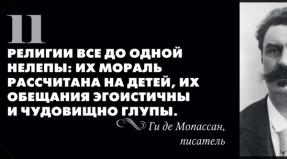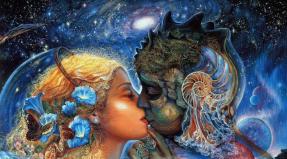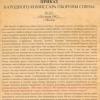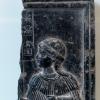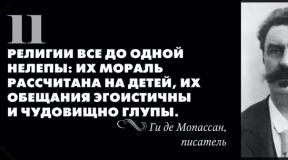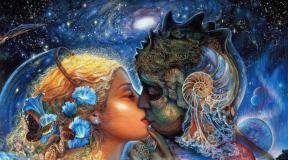Nietzsche on Christianity. Friedrich Nietzsche on Christianity Friedrich Nietzsche from the point of view of Orthodoxy
In April 1864, Nietzsche created two philosophical and poetic essays: “Fate and History” and “Free Will and Fate,” which contain almost all the main ideas of his future works. In the second essay, Nietzsche’s sharp attacks against the Christian idea of the other world seem most remarkable: “The fact that God becomes man only indicates: man must seek his bliss not in infinity, but create his own heaven on earth; the illusion of the unearthly world distorted the relationship of the human spirit to the earthly world: it was the creation of the childhood of peoples. In grave doubts and battles, humanity matures: it realizes in itself the beginning, core and end of religions.”
These thoughts will, of course, be developed much later. Nietzsche wrote The Gay Science in Genoa in 1882. in one of the fragments of which - “Mad Man” - the theme of the “death of God” arises, the authority of God and the church disappears, and in their place comes the authority of conscience, the authority of reason. In 1883, Nietzsche wrote Thus Spoke Zarathustra in just a few months, the first part of which ends with the words: “All the gods are dead; now we want the superman to live.”
Nietzsche's superman is the result of the cultural and spiritual improvement of man, a type that is so superior to the modern Nietzsche man that he forms a new and special biological type. Superman is a moral image, meaning the highest level of spiritual flowering of humanity, the personification of new moral ideals, this superman comes to the place of the deceased God, he must lead humanity to perfection, must restore in strength all the qualities of man.
Nietzsche attacked one of the main tenets of the Christian belief in eternal existence by the grace of God in the other world. It seemed absurd to him that death should be the atonement for the original sin of Adam and Eve; he expressed the amazing idea that the stronger the will to live, the more terrible the fear of death. And how can you live without thinking about death, but knowing about its inexorability and inevitability, without being afraid of it?
In the face of death, few people will find the courage to say that “There is no God.” The dignity of the superman appears from overcoming the fear of death, but in a completely different way than in Christianity. While a Christian is not afraid of death, because he believes in the eternal life given to him by God, Nietzsche’s superman is not afraid of death, although he does not believe in God or immortality, he feels himself to be God. Nietzsche says that the courageous superior man “with pride” contemplates the abyss. People believe in God only because they are afraid of death. He who conquers the fear of death will himself become God.
People in past centuries embodied their dream of perfection in the idea of the existence of God as a supreme and perfect personality and thereby recognized the impossibility of achieving perfection, for God is an otherworldly, inaccessible, incomprehensible being.
The death of God was required by Nietzsche to establish the life of the superman as the highest ideal of human earthly existence. Nietzsche's superman appears as an earthly, this-worldly and seemingly completely achievable ideal, by striving towards which a person acquires a real opportunity to overcome his imperfect state and become higher than himself.
What does "God is dead" mean? – That the world has lost its meaning. This means that it is necessary to fill the world with a different meaning, to establish new ones instead of dead values. “All the gods have died, now we want the superman to live,” says Zarathustra. The death of God opens up the possibility of freedom to create new values and a superman.
What did Nietzsche accuse Christianity of? The fact that Christianity is a religion of compassion, a religion of weak and sick people, that Christianity leads to unfreedom and non-resistance of man, that Christianity operates with completely imaginary concepts, that it elevates the “sinfulness” of man and that, finally, religion and science are incompatible.
Christianity picked up Plato’s fictional true, supersensible, otherworldly world of higher ideals, norms, principles, goals and values, which was erected above earthly life in order to give the latter order and internal meaning. Since the other world was understood as perfect, unconditional, absolute, true, kind, beautiful, desirable, the earthly world in which people live with all their affairs, worries, difficulties and deprivations was presented as only apparent, imperfect, unreal, deceptive, vicious world.
The artificially erected true world appeared in the minds of people as a certain ideal, which was given appropriate attributes in the form of various values and goals, and which, in connection with this, became the basis for criticism of the earthly world known to us, because the first seemed more valuable and significant than the second.
In this regard, Nietzsche opposed the recognition of the existence of an ideal world. The really existing world is the only world, and a certain “ideal world” is a kind of repetition of the existing world. This ideal world is a healing, comforting world of illusions and fictions, it is everything that we value and experience as pleasant. He is the source of the most dangerous attempts on life, the greatest doubts and all kinds of devaluation of the world that we represent. Thus, earthly life becomes devoid of meaning and value and begins to be rejected.
At the same time, the “perfect” world, according to Nietzsche, was created on the basis of the suffering and powerlessness of people. Those who despise the body and earth for the sake of the other world are the sick and dying. In the depths of Christianity lives the hatred of sick people, an instinct directed against healthy people. Lacking independence, health, intellectual ability, physical strength, the common people, the weak, the sick, the tired, the outcast, the destitute, the mediocre, the losers, use Christian morality to justify their lack of power and self-confidence and to fight against strong and independent people.
It is they, “decadent people,” and not strong personalities, who need mutual assistance, compassion, mercy, love from others, and humanity. Without this, they simply would not have been able to survive, much less impose their dominance and avenge themselves and their innate defectiveness and inferiority. For higher people, such moral values are not only unnecessary, but also harmful, because they weaken their souls. They therefore share values of an opposite nature, which are associated with the affirmation of the instinct of the will to
life and power.
In his book Beyond Good and Evil, Nietzsche writes that “wherever religious neurosis appears on earth, we find it in connection with three dangerous dietary prescriptions: solitude, fasting and sexual abstinence.”
One can also recall Nietzsche’s well-known position, which causes much controversy: “Push the one who is falling.” What meaning does the philosopher put into this in itself unattractive thesis? Nietzsche primarily has in mind a critique of Christianity in
By being compassionate to someone, a person himself becomes weaker. Compassion increases many times
Loss of strength and suffering are already costly. Nietzsche believes that compassion paralyzes the law of development - the law of selection, when the weak and sick must die to make way for the strong and healthy; compassion keeps alive something that is ripe for death. Therefore: “Let the weak and ugly perish - the first commandment of our love for mankind. We must also help them die. What is more harmful than any vice? – to have compassion for the weak and crippled is Christianity.”
Any religion arose out of fear and need, when people knew nothing about nature and its laws; everything was a manifestation of mystical forces that could be pacified through prayers and sacrifices. Nietzsche writes that Christianity does not come into contact with reality at any point; religion contains entirely fictitious concepts: God, soul, spirit, sin, punishment, redemption, grace, the Last Judgment, eternal life.
Christianity contrasts the spiritual (pure) and the natural (dirty). And, as Nietzsche writes, “this explains everything.” Who has any reason to hate the natural, the real? -–For the one who suffers from this reality. And it is the weak and sick who suffer from reality, whom compassion keeps “afloat.”
The Church elevates the sick or insane to the rank of saints, and the “highest” states of the soul, religious ecstasy, remind Nietzsche of epileptoid states.
Christianity arose to make people's lives easier, but now it must first burden their lives with the consciousness of sinfulness in order to then be able to make it easier for them. The Church has arranged everything in such a way that now you can’t take a step without it: all natural events (birth, wedding, death) now require the presence of a priest who would “sanctify” the event. Christianity preaches the sinfulness and contemptability of man in general, so that it is no longer possible to despise other people. By putting forward excessive demands, comparing a person with a perfect God, the church makes a person feel sinful, bad, he needs supernatural powers to remove this burden, in order to be “saved” from “sinfulness,” but when the idea of God disappears, then the feeling also disappears. "sin" as a violation of divine instructions.
Instinctive hatred of reality, rejection of antipathy, enmity, as a consequence of morbidity, only lead to the fact that a person does not want to resist, does not want to fight this reality - and Christianity appears, the religion of love, that is, non-resistance and submission. “Don’t resist, don’t get angry, don’t call for accountability. And don’t resist evil – love it.”
Religion is an inhibitory, interfering, negative factor for society. Religion serves the masses, it is a weapon of the mob and slaves. In Christianity, the hatred of the mob, the ordinary person, towards the nobles finds its expression. God, holiness, love for one's neighbor, compassion are prejudices invented by those whose lives are empty and monotonous. Faith in God does not elevate or spiritualize a person, but, on the contrary, fetters him and deprives him of freedom. A free person does not need God, because he is the highest value for himself.
“Christianity is a rebellion of the creeping things on the earth against everything that stands and stands tall: the gospel degrades the “low” ones,” “Christianity waged a life-and-death struggle with the higher type of man, it anathematized all his basic instincts and extracted from them evil. Christianity took the side of everything that was weak, base, and ugly; it formed its ideal in opposition to the instincts of preserving life, life in strength.”
For Nietzsche, the question of faith is connected with the problem of morality, values and human behavior. The meaning and purpose with which Nietzsche declared war on Christianity is the abolition of morality. The death of God opens up for man the possibility of creative freedom to create new worlds of value. In death lies rebirth. In place of spiritual values associated with the idea of God, Nietzsche puts diametrically opposed values arising from the needs and goals of the real life of the superman.
The arrival of the superman is due to the process of human formation, the rejection of the existence of God and the moral and religious values associated with him. This leads to total nihilism and revaluation of all values in Nietzsche's philosophy. Nietzsche sees the purpose of human existence in the creation of that which is higher than man, namely in the creation of a superman, who should surpass man to the same extent that the latter surpasses the monkey.
Taken by himself, a person, due to his imperfection, cannot be a goal for himself. In the chain of development of the living world, he represents a bridge between animals and the superman, and therefore the content of his life is transition and death, that is, not the result, but the process of becoming, a person must sacrifice himself to the earth so that it becomes the land of the superman.
Revealing the content of Christian morality, Nietzsche notes that this is the morality of altruism, kindness, love for one's neighbor, compassion and humanism. Since it is a herd morality that does not express the natural life instincts of an individual person, its establishment and maintenance in people’s lives is possible only through coercion. Christian morality is a duty to which all must obey unquestioningly.
For such subordination to be realized, the idea of God as the highest moral ideal, authority and judge is needed, who not only prescribes moral standards, but also tirelessly and scrupulously monitors their implementation: punishes sinners (with torture in hell) and rewards the righteous (with a serene life in paradise) . Fear of God's punishment is the main motive for moral behavior of people.
One of the initial and key postulates of Nietzsche’s analysis of the characteristics of Christian morality is the thesis about the presence of innate ranks among people, that is, that people are not equal. In his opinion, depending on the degree of power and completeness of the will to power available to individuals from birth, as well as the presence of physiological superiority, people are divided into two breeds (races) - the lower (which includes the vast majority of people) and the higher (a small minority ). Nature itself distinguishes the strong in spirit, muscles and mediocre people, of whom there are many more.
In this regard, the proposition “what is fair for one is fair for another” cannot be valid in morality. So, if one person recognizes such moral requirements as “thou shalt not kill”, “thou shalt not steal”, then another may evaluate them as unfair. Therefore, in a society there should be as many morals as there are ranks (layers) among people.
According to Nietzsche, “there is a morality of masters and a morality of slaves.” At the same time, diametrically opposed moral values arise and become established in the lives of both. Christian morality is a misunderstanding because, first of all, it is designed to overcome passions and instincts in order to correct a person and make him better based on the demands of reason. However, according to Nietzsche, the rise of virtue is incompatible with the simultaneous growth of intelligence and understanding, and the source of happiness lies not in reason at all, but in life instincts.
Therefore, to abandon passions and instincts in morality means to undermine the root of human life and thereby give morality an unnatural state. According to Nietzsche, all morality denies life, because it is aimed at combating human instincts and drives. Christian moralists tried with all their might to suppress, eradicate, tear out and thereby cleanse the human soul of filth. The basis for this was the fact that passions are often the source of great troubles. In addition, being associated with people’s desire for fleeting pleasures and pleasures, they were presented as a manifestation of the animal nature in man, and therefore were assessed as abnormal and dangerous phenomena.
When an individual becomes subject to his passions, he loses the ability to rationally control his behavior and thereby, albeit temporarily, ceases to be a thinking being. But in a person’s life, only that which is correct and normal is guided by reason. From this the conclusion was drawn that a person cannot be “good” until he frees himself from his bad and reprehensible passions.
Christian morality, as the instinct of the herd, as a kind of illusion of the race, is a certain tyranny and oppression in relation to an individual person, especially and above all the highest. By forcing one to fulfill a moral duty, it deprives a person of freedom, independence, independence, activity, creativity and forces him to sacrifice himself for the future. To be moral means to show obedience and obedience to anciently established law or custom. The personality thereby becomes dependent on moral traditions. In this regard, it turns out that the only thing worthy of respect in her is the extent to which she is able to obey.
The morality of duty requires the individual to constantly control himself, that is, to strictly follow and obey its once and for all established rules, which, in the presence of inevitable manifestations of his natural impulses and inclinations, cannot but generate irritability and internal tension. fulfilling the same moral standards for everyone, a person turns out to be programmed in his behavior to a certain standard and mode of action, which destroys his individuality, because it does not allow him to express himself.
Duty forces a person to work, think, feel without internal necessity, without deep personal choice, without pleasure, that is, automatically. This leads to the impoverishment of the personality, to its self-denial and denial of its uniqueness. Finding himself in the sphere of morality, the individual is doomed, in addition, to constant painful dissatisfaction with himself, since he is unable to achieve the moral ideals and goals prescribed to him. A person ceases to belong to himself and strive to achieve his interests, which precisely express the will of his life instincts. Thus, a person begins to choose and prefer not what he needs, but what is harmful to him.
A moral duty that limits personal freedom through education is introduced into the spiritual world of a person in the form of conscience, which is a consciousness of guilt and at the same time a kind of internal tribunal that constantly forces the individual to be subordinate to society. Conscience is a social duty, that is, a herd instinct that has become an internal conviction and motive for individual behavior. She condemns the act because it has been condemned in society for a long time.
Rejecting Christian morality, the main concept of which is the concept of guilt, Nietzsche could not help but reject conscience as the consciousness of guilt. For Nietzsche, conscience appears as a purely negative phenomenon, unworthy of any respect. Nietzsche called for the “amputation” of conscience, which in his understanding is only the consciousness of guilt, responsibility, obligation, and some kind of judgment.
In place of Christian morality, Nietzsche proposed a morality of egoism, when the behavior of an individual person becomes extremely liberated. Selfishness is a person’s way of living at the expense of others. For an egoist, others matter only as means. The goal is himself, always and under any circumstances. Egoism is the main point in the art of self-preservation of the individual and his becoming himself. Only in the morality of egoism does a person acquire consciousness of his infinite value.
According to Nietzsche, not everyone should have the right to selfishness, but only the highest people, with whose lives the development of the human race is supposedly connected. Ignorant, weak and mediocre people do not have the right to selfishness, since it would direct them towards self-affirmation and taking away their place in the sun from higher people. Therefore, “the weak and the unsuccessful must perish: the first principle of our love for man. And they should still be helped in this.”
Christianity imposes an imaginary meaning on life, thereby preventing the identification of the true meaning and replacing real goals with ideal ones. In a world in which “God is dead” and moral tyranny no longer exists, man remains alone and free. But at the same time he becomes responsible for everything that exists, for the mind finds complete liberation only when guided by a conscious choice, only by taking on certain obligations. And if necessity cannot be avoided, then true freedom lies in its complete acceptance. to accept the earthly world and not entertain illusions about the other world - this means dominating everything earthly.
Nietzsche rejected Christianity because it denies freedom of spirit, independence and responsibility of man, turns unfreedom into an ideal, and humility into a virtue.
- this is what lies on one side of the scale, while the mind always lies on the second.
Arthur Schopenhauer, philosopher
You can explain the existence of gas stations to a Martian. But it will be very difficult to explain to him why all these churches are needed. -John Updike writer

By teaching religion in schools, these church bastards, to put it mildly, want to lure the souls of children. -Vitaly Ginzburg physicist
What magnificent fools religion makes of people! -Ben Jonson playwright

There is too little love and goodness in the world to be lavished on imaginary beings. -Friedrich Nietzsche philosopher
I suppose I would have been a good Christian, but the church did everything to turn me into a complete atheist. -Friedrich Schiller playwright
Civilization will not reach perfection until the stone of the last church falls on the head of the last priest.
Emile Zola writer

The absence of God is difficult to prove. If I suggest that there is a porcelain teapot orbiting around the Sun between Earth and Mars, no one can disprove it, especially if I carefully add that it is so small that even the most powerful telescopes cannot see it. -Bertrand Russell mathematician

God is a plug for the hole of the unknown. -Anatoly Lunacharsky, politician
The Christian concept is disgusting. It makes of God either embodied anger, and, moreover, infinite anger, which created thinking beings in order to make them eternally unhappy, or embodied impotence and feeble-mindedness, unable to either predict or prevent the misfortunes of its creatures. -Francois Voltaire, philosopher
The blood shed by the worshipers of the God of mercy and peace since the introduction of His religion would perhaps be sufficient to drown the adherents of all other sects living on the globe. -Percy Shelley, poet
Reason is the main enemy of all faith. -Martin Luther, priest

Religion has always seemed indecent to me.
Ingmar Bergman, director
If God exists, then atheism certainly offends him less than religion.
Jules Goncourt writer

Thank God I'm an atheist! -Luis Buñuel, director

I am sure that a serious scientist studying the laws of nature or human society will not be able to maintain faith, because everything around him will dissuade him from the dogmas he has learned from childhood. -Umberto Eco writer

All thinking people are atheists. -Ernest Hemingway writer
Piety finds such justifications for bad actions that a simple decent person would not find.
Charles Montesquieu philosopher
No religion can do anything for humanity. -Stanislav Lem writer

If you look at the ratio of all living beings in the world, it turns out that most of all the Lord loves microbes and insects. -Conrad Lauren biologist
Prayer is a demand to change all the laws of the Universe for the sake of one, clearly unworthy, petitioner. -Ambrose Bierce journalist

Religion is regarded by ordinary people as truth, by smart people as a lie, and by the government as a useful thing.
Edward Gibbon historian

You shouldn't believe in something just because it would be terrible if it didn't exist. -Jean Rostand biologist
Religiosity is simply one of the by-products of our behavior as a species. Quite harmful, it should be noted.
Ernst Mayr zoologist
It's amazing how all these priests and soothsayers, looking at each other, can refrain from laughing. - Cicero politician
The people positively demand that they be deceived, otherwise it is impossible to deal with them. -Synesius, bishop

Calling believers donkeys is unfair, because donkeys are never so stubborn. -Luis Velez de Guevara, writer
He who has science does not need religion. -Johann Goethe, poet

I have never tried to find God, thinking that if He is as smart as he is described, he will be able to find me himself.
Isaac Asimov physicist
There is nothing more remarkable than the spread of religious unbelief that I see in the world today.
Charles Darwin biologist
You ask what I think about the sweet feeling of absolute faith? I think this is absolutely terrible and completely unacceptable. -Kurt Vonnegut writer

The religion of mortals encourages them to commit great atrocities. - Lucretius poet
With certain certain tendencies towards vegetative life, a hermit may turn into a cucumber instead of an angel. This is an occupational hazard. -Andre Frossard journalist
The most important task facing religion today is to disappear as quickly and painlessly as possible. -Joseph Dietzgen philosopher
It is strange that all religions devote so much time to miracles, while every schoolchild knows that a miracle, that is, violation of the laws of the Universe, is impossible. -Max Planck physicist
God is good only in that one can always refer to him, unless some other authority comes to mind. Churchill
For you I am an atheist, but for God I am a constructive opposition. -Woody Allen director
The power of the priest depends on the superstition and stupid gullibility of the people. He doesn't need them to be enlightened at all. The less they know, the more submissive they are to his decisions. -Claude-Adrian Helvetius philosopher
If you read the Bible with your eyes open, you will be convinced that it was written by people, and very unpleasant and poorly educated ones. -Robert Ingersoll lawyer

The ancients, observing natural phenomena - thunder, lightning, eclipses of the moon and sun, were horrified and believed that the gods were the cause. They did not understand that there was nothing in the world other than them that would be endowed with a divine nature. -Democritus philosopher
The Lord is gradually turning from an almighty helmsman into the fading smile of the cosmic Cheshire Cat. Julian Huxley writer
Apparently, God deliberately made people so gullible to make it easier for priests to deceive them.
George Halifax politician
Perhaps not everything in religion is so bad, but Sunday morning is still worth spending on something truly useful. Bill Gates
MORE SERIOUS PEOPLE ABOUT RELIGION
It is not our business to prescribe to God how he should this world should be ruled.- Niels Bohr

For every human society there comes a time when the sacred symbol, under the suppression of free thought, wears out and is erased, when a person escapes the attention of the clergy, when the tumor of philosophical theories and state systems corrodes the face of religion. - Victor Hugo
How many atheists do not realize that their kindness and sadness are the same prayer addressed to God! - Victor Hugo
.jpg/200px-Jean-Jacques_Rousseau_(painted_portrait).jpg)
How much captivating kindness is in His teaching! What a height in His rules! What depth of wisdom is in His speeches! What presence of the Spirit, what insight and faithfulness in His answers!- Jean Jacques Rousseau
Only little knowledge removes one from God; great knowledge brings one closer to Him again. - Francis Bacon
Charles Dickens
The Bible contains more evidence of authenticity than all of secular history. - Isaac Newton

“Let scientific culture develop, let natural science prosper in depth and breadth, let the human mind develop as much as it likes, but they will not surpass the cultural and moral level of Christianity, which shines in the Gospels.”- Goethe
“The mind is not the highest ability in us. Its position is no more than that of a police officer: it can only put in order and put in place everything that we already have. It itself will not move forward until all other abilities move in us , from which he becomes wiser. Abstract readings, reflections and incessant listening to all courses of science will only force him to move forward too much; sometimes this even suppresses him, interfering with his original development. He is incomparably more dependent on mental states: as soon as passion rages, he suddenly acts blindly and stupidly; but if the soul is calm and no passion is boiling, he himself becomes clear and acts wisely. Reason is an incomparably higher ability, but it is acquired only by victory over passions. who have not neglected their inner education. But reason does not give a person the full opportunity to strive forward. There is still a higher ability; its name is wisdom, and only Christ can give it to us."- Gogol
Without love for God, no one can be saved, but you do not have love for God. You won’t find her in the monastery; Only those who have already been called there by God Himself go to the monastery. Without the will of God it is impossible to love Him. And how can one love Him Whom no one has seen? With what prayers and efforts can I beg this love from Him? Look how many kind and wonderful people there are now in the world who eagerly strive for this love and hear only callousness and cold emptiness in their souls. It's hard to love someone whom no one has seen. Christ alone brought and told us the secret that in love for our brothers we receive love for God. [ 118 ] One has only to love them as Christ commanded, and in the end love for God Himself will come naturally. Go into the world and first acquire love for your brothers.
But how to love brothers, how to love people? The soul wants to love only the beautiful, but poor people are so imperfect and have so little beauty in them! How to do this? Thank God first of all for the fact that you are Russian. For the Russian this path is now opening, and this path is Russia itself. If only a Russian loves Russia, he will love everything that is in Russia. God Himself is now leading us to this love. Without the illnesses and suffering that had accumulated in such abundance inside her and which were our own fault, none of us would have felt compassion for her. And compassion is already the beginning of love. Already the cries against outrages, lies and bribes are not just the indignation of the noble against the dishonest, but the cry of the whole earth, which heard that foreign enemies had invaded in countless numbers, scattered to their homes and imposed a heavy yoke on every person; Even those who voluntarily accepted these terrible spiritual enemies into their homes want to free themselves from them, and do not know how to do this, and everything merges into one stunning cry, even the insensitive ones are already moving forward. But direct love has not yet been heard in anyone - you don’t have it either. You don’t yet love Russia: you only know how to be sad and irritated by rumors about everything bad that happens in it, all this produces in you only callous annoyance and despondency. No, this is not love yet, you are far from love, this is perhaps just one too distant harbinger of it. No, if you really love Russia, then by itself that short-sighted thought that has now arisen in many honest and even very intelligent people will disappear in you, that is, that at the present time they can no longer do anything for Russia and that they are already not needed at all; on the contrary, only then will you feel with all your strength that love is omnipotent and that you can do anything with it. No, if you really love Russia, you will be eager to serve her; You won’t go to governor, but to police captain; you’ll take the last place you find in it, preferring one grain of activity on it to your entire current, inactive and idle life. No, you don't love Russia yet. And if you don’t love Russia, you won’t love your brothers, and if you don’t love your brothers, you won’t be kindled with love for God, and if you don’t kindle with love for God, you won’t be saved. - Gogol

“Lord! what a book is this Holy Scripture, what a miracle and what power is given to man with it!...And how many mysteries are resolved and revealed! I love this book! Death to the people without God’s Word, for the soul thirsts for this word and for every beautiful perception ". - Dostoevsky
I think that we will never give the people anything better than Scripture... The Bible is universal, it contains all of human life... This is the only book in the world - it contains everything. - Pushkin
44
- The Gospels are invaluable as evidence of the already uncontrollable corruption within the first communities. What Paul later brought to an end with the logical cynicism of a rabbi was only the process of disintegration that began with the death of the Savior. - When reading these Gospels, you need to be as careful as possible: behind every word there is a difficulty. I admit - and they will support me - that it is precisely this that they give the psychologist primary pleasure - as the opposite of any naive depravity, as sophistication par excellence, - as virtuosity in psychological depravity. The Gospels speak for themselves. The Bible generally stands beyond comparison. In order not to get completely lost here, first of all you need to remember that you are among Jews. The game of “sacred”, which has reached such a genius here that it has not achieved anywhere else - neither in books, nor among people - cheating in words and gestures, like art - is not an accident of some individual talent, such as something of an exceptional nature. This is a racial identity. In Christianity as the art of sacred lying, all Judaism, all the most rigorous centuries-old Jewish training and technology reach the extreme limits of mastery. A Christian, this ultima ratio of lies, is a Jew to the second, even third degree... The basic will, directed only to deal with such concepts, symbols, body movements, which are proven from the practice of the priest, an instinctive evasion from any other practice, from the prospects of any of a different kind of assessments and utilities - this is not only tradition, this is heredity: only as heredity does it act, like nature. All of humanity, even the best minds of the best times (except for one, who, perhaps, is the only one who is not a person) allowed themselves to be deceived. The Gospel was read as a book of innocence... not the slightest indication of the skill with which the game was being played here. - Of course, if we saw them, even just in passing, all these amazing hypocrites and magician-saints, then we would be finished with them - and precisely because I don’t read a single word without seeing gestures, I and finished with them... I can’t stand the well-known way of looking up to them. - Fortunately, for the majority of people, books are only literature. You cannot allow yourself to be misled: “don’t judge!” - they say, but they themselves send to hell everything that stands in their way.
By turning the judgment over to God, they judge themselves; glorifying God, they glorify themselves; demanding those virtues that are precisely characteristic of them - even more, which they need in order not to go down at all - they give themselves the majestic appearance of a struggle for virtue, a struggle for the dominance of virtue. “We live, we die, we sacrifice ourselves for the good” (“Truth”, “Light”, “Kingdom of God”): in reality, they do what they cannot help but do. Sitting in the corner, cowering like a mole, living in the shadows, like a ghost, they create a duty out of this: according to duty, their life is humility, just as humility is additional proof of piety... Ah, this humble, chaste, soft-hearted kind of lie! - “Virtue itself must testify for us”... Read the Gospels as books of temptation through morality: these little people confiscate morality - they know how to handle morality! People are best fooled by morals! - the reality is that here the most conscious conceit of the chosen ones plays out modesty: they put themselves, the “community”, the “good and just” once and for all on one side, on the side of “truth”, and everything else, the “world”, on the other ... It was the most fatal kind of megalomania that has ever existed on earth: little degenerates of saints and liars began to use the concepts of “God”, “truth”, “light”, “spirit”, “love”, “wisdom” ", "life" as synonyms for themselves, in order to thereby delimit the "world" from themselves; little Jews in the superlative, mature for any madhouse, turned all the values in accordance with themselves, as if “Christian” were the meaning, the salt, the measure, as well as the final judgment of everything else... All further fate was predetermined by the fact that in the world there already existed a kindred race, the type of megalomania is Jewish: as soon as the abyss opened up between the Jew and the Jewish Christian, the latter had no choice but to turn the same procedure of self-maintenance, which the Jewish instinct inspired, against the Jews themselves, while the Jews had turned it until now only against everything that is not Jewish. A Christian is the same as a Jew, only of a “freer” confession.
45
- I will give a few examples of what stuck in the heads of these little people, what they put into the mouth of their teacher: this is a real recognition of “beautiful souls” ...
“And if anyone will not receive you or listen to you, then when you go out from there, shake off the dust from your feet as a testimony against them. Truly I say to you, it will be more tolerable for Sodom and Gomorrah on the day of judgment than for that city” (Mark 6:11). - How evangelical this is!..
“But whoever causes one of these little ones who believe in Me to stumble, it would be better for him if a millstone were hung around his neck and he were thrown into the sea” (Mark 9:42). - How evangelical this is!..
“And if thine eye causes thee to sin, pluck it out: it is better for thee to enter into the kingdom of God with one eye, than with two eyes, and be cast into hell of fire, where the worm dieth not, and the fire is not quenched” (Mark 9:47). - It’s not just the eye that is meant here...
“And he said to them, “Truly I say to you, there are some standing here who will not taste death until they see the kingdom of God come with power” (Mark 9:1). - Well lied, lion.
“If anyone wants to come after Me, let him deny himself, and take up his cross, and follow Me. For...” (Psychologist’s note. Christian morality is refuted by this “for”: to refute its “foundations” is Christian) (Mark 8, 34).
"Judge not lest ye be judged. With the measure you use, it will be measured to you” (Matthew 7:1). - What a concept of justice, of a “righteous judge”!..
“For if you love those who love you, what reward will you have? Don't publicans do the same? And if you greet only your brothers, what special thing are you doing? Don’t tax collectors do the same?” (Matt. 5:46). - The principle of “Christian love”: it wants to be well paid in the end...
“And if you do not forgive people their trespasses, then your Father will not forgive you your trespasses” (Matthew 6:15). - Very compromising of the above-mentioned “Father”...
“Seek first the kingdom of God and His righteousness, and all these things will be added to you” (Matthew 6:33). - All this: i.e. food, clothing, all the essential needs of life. A fallacy, to put it modestly... Shortly before this, God appears as a tailor, at least in certain cases...
“Rejoice in that day and be glad, for your reward is great in heaven. This is what their fathers did to the prophets” (Luke 6:23). - Shameless brat! They are already comparing themselves to the prophets!..
“Do you not know that you are the temple of God, and the Spirit of God dwells in you? If anyone destroys the temple of God, God will punish him, for the temple of God is holy; and this temple is you” (I Corinthians 3:16). - There is no sufficient measure of contempt for such a thing...
“Do you not know that the saints will judge the world? If the world is to be judged by you, are you really unworthy to judge unimportant matters?” (I Corinth. 6, 2). Unfortunately, not only the speech of a madman... This terrible liar continues: “Don’t you know that we will judge angels, much less the deeds of this life”!..
“Has God not turned the wisdom of this world into foolishness? For when the world through its wisdom did not know God in the wisdom of God, it pleased God through the foolishness of preaching to save those who believe... there are not many of you wise according to the flesh, not many strong, not many noble. But God has chosen the foolish things of the world to shame the wise, and God has chosen the weak things of the world to shame the strong things; God chose both the base things of the world and the things that are despised, and the things that are not, to bring to nothing the things that are, so that no flesh should boast before God” (I Corinthians 1:20 ff.). - To understand this passage - first-rate evidence for the psychology of any Chandala morality - you need to read the first consideration of my “Genealogy of Morals”: there for the first time the opposition between aristocratic morality and Chandala morality, born of ressentiment and impotent revenge, was brought to light. Paul was the greatest of all the apostles of vengeance...
46
- What follows from this? What is good is to wear gloves when reading the New Testament. The proximity of such a mass of uncleanliness almost forces one to do so. We would just as little want to communicate with the “first Christians” as with the Polish Jews - not because we have anything against them: both of them smell bad. - In vain I looked for at least one nice feature in the New Testament: there is nothing there that could be called free, kind, frank, honest. Humanity has not yet taken its first step here - the instincts of cleanliness are lacking... In the New Testament there are only bad instincts, and there is not even the courage to face these bad instincts. Sheer cowardice, sheer closing of eyes and self-deception. Every book seems clean if you read it after the New Testament; so, for example, immediately after Paul I read with admiration that charming, perky mocker Petronius, about whom one could say the same thing that Domenico Boccaccio wrote to the Duke of Parma about Cesare Borgia: “è tutto festo” - immortally healthy, immortally cheerful and successful ... These little hypocrites miscalculate exactly the main thing. They attack, but whatever they attack is thereby distinguished. Whoever is attacked by the “first Christian” is not sullied by this... On the contrary: there is some honor in having the “first Christians” against you. Reading the New Testament, you give preference to everything that it disparages, not to mention the “wisdom of this world,” which the impudent liar tries in vain to disgrace with “foolish preaching”... Even the Pharisees and scribes benefit from such opponents: there must be something in them valuable if they are so indecently hated. Hypocrisy - this is the reproach that the “first Christians” dared to throw!
It is enough that they were privileged - the Chandala's hatred does not need other grounds. The “first Christian” - I’m afraid that the “last” too, whom I may still outlive - is, by his basest instincts, a rebel against everything privileged - he lives, he always fights for “equal rights”... If you look closely, then he has no other choice. If they want to be in their own person “the chosen ones of God”, or “the temple of God”, or “the judge of the angels”, then any other principle of choice, for example the principle of truthfulness, intelligence, masculinity and pride, beauty and freedom of heart, simply “peace” - is already evil in itself... Moral: every word in the mouth of the “first Christian” is a lie, every act he commits is an instinctive lie - all his values, all his goals are harmful, but who does he hate, what does he hate, then has value... A Christian, a Christian priest in particular, is a criterion of values... Need I also say that in the entire New Testament there is only one figure worthy of respect? Pilate, Roman governor. He cannot bring himself to take the Jewish dispute seriously. One more or less Jew - what is the importance?.. The noble mockery of the Roman, before whom the shameless abuse of the word “truth” occurs, enriched the New Testament with a new expression that has a price, which in itself is his criticism, his negation: “what is true!.."
47
- It is not that what distinguishes us from others is that we do not find God either in history, or in nature, or behind nature, but that we feel what is revered as God not as “divine”, but as pitiful, absurd, harmful - not as delusion only, but as a crime against life... We deny God as God... If this God of Christians were proven to us, we would be even less able to believe in him. - According to the formula: deus qualem Paulus creavit, dei negatio. - A religion, which, like Christianity, does not come into contact with reality at any point, which falls immediately, as soon as reality asserts its rights at least at one point - in justice, must be mortally hostile to the “wisdom of the world”, in other words, to science, - for her, all means will be good that can poison, slander, dishonor the discipline of the spirit, clarity and severity in matters of conscience, spiritual nobility and freedom. “Faith” as an imperative is a veto against science, in praxi a lie at all costs... Paul understood that the lie that “faith” was necessary: the church later understood Paul. - That “God” that Paul invented, the God who disgraces the “wisdom of the world” (i.e., actually, the two great enemies of all superstition - philology and medicine), is truly only the bold decision of Paul himself to call his own will “God” , thora, is purely Jewish. Paul wants to disgrace “the wisdom of the world”; his enemies are good philologists and doctors of Alexandrian training; he declares war on them. Indeed, a philologist and doctor cannot but be at the same time an anti-Christian. The philologist looks behind the “sacred books”, the doctor looks behind the physiological unfitness of the typical Christian. The doctor says: “incurable”, the philologist: “charlatan”...
48
- Did they understand the famous story that is placed at the beginning of the Bible - the story about God’s hellish fear of science?.. It was not understood. This priestly book par excellence begins, as one might expect, with the great inner difficulty of the priest: he has only one great danger, therefore God has only one great danger...
The old God, the “spirit” entirely, the real high priest, the true perfection, is strolling in his garden: the only trouble is that he is bored. Even the gods fight in vain against boredom. What is he doing? He invents man: man is entertaining... But what is it? and the person is also bored. God's mercy is limitless for that one calamity from which no paradise is free: God immediately created other animals. God's first mistake: man did not find animals entertaining - he dominated them, he did not want to be an “animal.” - Because of this, God created woman. And indeed, the boredom was over - but not yet with the rest! The woman was God's second failure. - “A woman is essentially a snake, Heva” - every priest knows this; “Every misfortune in the world comes from a woman” - every priest also knows this. “Consequently, science comes from her”... Only through a woman did man learn to eat from the tree of knowledge. - What happened? The old God was gripped by hellish fear. Man himself has become God's greatest blunder, he has created a rival in him: science makes him equal to God - the end of priests and gods comes when man begins to learn science! - Moral: science is something prohibited in itself, it alone is prohibited. Science is the first sin, the seed of all sins, original sin. This alone is morality. - “You should not know”; the rest all follows from this. - Hellish fear does not prevent God from being prudent. How to protect yourself from science? - this became his main problem for a long time. Answer: get man out of heaven! Happiness and idleness lead to thoughts - all thoughts are bad thoughts... A person should not think. - And the “priest in himself” invents need, death, pregnancy with its danger to life, all kinds of disasters, old age, the hardship of life, and above all illness - all the right means in the fight against science! Need does not allow a person to think... And yet! terrible! The work of knowledge rises, rising to the skies, darkening the gods - what to do? - The Old God invents war, he separates peoples, he makes it so that people mutually destroy each other (the priests always needed war...). War, along with other things, is a great obstacle to science! - Incredible! Knowledge and emancipation from the priest even increases, despite the war. - And now the last decision comes to the old God: “man has learned science, nothing helps, we need to drown him!”...
50
- I will not pass over in silence here the psychology of “faith”, “believers” precisely for the benefit of the “believers” themselves. If now there is still no shortage of those who do not know how indecent it is to be a “believer” or that this is a sign of decadence, a crippled will to live, then tomorrow they will already know this. My voice reaches those who are hard of hearing. - It seems, unless I heard correctly, Christians have a criterion of truth, which is called “proof from strength.” “Faith makes one blessed: therefore it is true.” - One could object that bliss is not proven here, but only promised; bliss is conditioned by “faith”: you must become blessed because you believe... But how is it proven that what the priest promises to the believer as “otherworldly”, inaccessible to any control, actually occurs? - Thus, the imaginary “proof of force” is, at its core, again only faith in the fact that the action promised by faith will appear. According to the formula: “I believe that faith makes you blessed, therefore it is true.” - But we have come to the end. This “therefore” would be absurdum as a criterion of truth. - However, if we assume, with some condescension, that the delivery of beatitude is proven by faith (not only as something desired, not only as something promised by the suspicious lips of a priest), then has beatitude - technically speaking, pleasure - ever been a proof of truth? So little that it almost gives proof to the contrary; in any case, if the feeling of pleasure interferes with the discussion of the question “what is truth?”, then a great suspicion arises regarding the truth. “Pleasure” as proof is only proof of “pleasure” - nothing more. Where do we have the right to assert that it is true judgments that give more pleasure than false ones, and that, due to a pre-established harmony, they necessarily entail pleasant feelings? - The experience of all strict and deep minds teaches us the opposite. Every step towards truth had to be won, it was necessary to sacrifice for it everything that feeds our heart, our love, our trust in life. This requires greatness of soul. Serving the truth is the most severe service. -What does it mean to be honest in spiritual things? To be strict with your heart, to despise “beautiful feelings”, to make questions of conscience out of every Yes and No!.. Faith makes one blessed: therefore, it lies!..
51
That faith under certain circumstances makes one blessed, that bliss does not make a true idea out of an obsession, that faith does not move mountains, but rather piles up mountains where there are none at all - this can be sufficiently clarified by walking through a madhouse. Of course, not to the priest, for the priest, out of instinct, denies that illness is illness, that a madhouse is a madhouse. Christianity needs illness almost to the same extent as Greece needed an abundance of health: making people sick is actually the back thought of the entire system that the Church offers in the types of salvation. And is not the church itself - in its ultimate ideal - a Catholic madhouse? - And isn’t the earth itself a madhouse? - A religious person, as the church wants him to be, is a typical decadent; the time when a religious crisis dominates the people is always marked by nervous epidemics; The “inner world” of a religious person is so similar to the inner world of overexcited and exhausted people that they can be confused with each other. The “higher states” that Christianity imposed on humanity as the value of all values are epileptoid forms. The Church canonized only madmen or great deceivers in majorem dei honorem... I once allowed myself to characterize the entire Christian training of repentance and salvation (which can now best be studied in England) as a methodically taught folie circulaire, it goes without saying, on the basis of this already prepared, i.e. deeply painful. Not everyone can become a Christian: one does not “convert” to Christianity - for this one must become sick... We others, who have the courage to health and also to contempt, how can we not despise a religion that teaches us to disdain the body! who does not want to free herself from the prejudice about the soul! which makes a “merit” out of insufficient nutrition! which fights the healthy as if it were an enemy, the devil, temptation! who convinced herself that it was possible to drag out a “perfect soul” in a body like a corpse, and at the same time had the need to create for herself a new concept of “perfection”, something pale, sickly, idiotically dreamy, the so-called holiness; holiness is simply a series of symptoms of an impoverished, enervating, incurably corrupted body!.. The Christian movement as a European movement from the very beginning is a general movement of everything worthless and degenerate, which wants to gain power with Christianity. The Christian movement does not express the decline of a race, but it is an aggregate formed from forms of décadence gravitating towards each other. It was not the corruption of antiquity, noble antiquity, that made Christianity possible, as is believed. The learned idiocy that even now asserts something similar deserves the sharpest refutation. While the sick, corrupted strata of the Chandala were becoming Christianized throughout the empire, there existed precisely the opposite type, nobility in its most beautiful and mature form. But numbers gained dominance; the democracy of Christian instincts won... Christianity was not national, was not determined by race.
It appealed to all those disadvantaged by life, it had its allies everywhere. Christianity, relying on the rancune of the sick, turned instinct against the healthy, against health. Everything successful, proud, brave, beauty above all, painfully affects his hearing and vision. Once again I remember the invaluable words of Paul: “God has chosen the weak things of the world, the foolish things of the world, the base things of the world, the base things of the world”: this was the formula in hoc signo of which décadence triumphed. - God on the cross - is the terrible background of this symbol still not understood? Everything that suffers, that is on the cross is divine... We are all on the cross, therefore we are divine... We alone are divine... Christianity was a victory, the nobler perished in it, until now Christianity has been the greatest misfortune of humanity...
52
Christianity also stands in contradiction with all spiritual success, it needs only a sick mind, as a Christian mind, it takes the side of all idiocy, it utters a curse against the “spirit”, against the superbia of a healthy spirit. Since illness belongs to the essence of Christianity, then the typically Christian state, “faith,” must also be a form of illness; all direct, honest, scientific paths to knowledge must also be rejected by the church as forbidden paths. Doubt is already a sin... The complete lack of psychological purity, revealed in the priest’s gaze, is a manifestation of décadence. One can observe in hysterical women and rickety children how a natural expression of décadence is instinctive deceit, the pleasure of lying for the sake of lying, the inability for direct views and actions. “Faith” is the unwillingness to know the truth. The bigot, the priest of both sexes, is false because he is sick: his instinct demands that the truth should not claim its rights anywhere and in anything. “Whatever makes sick is good; what comes from fullness, from excess, from power is evil,” this is how the believer feels. Involuntariness in lying - by this sign I guess every theologian by vocation. - Another sign of a theologian is his inability to philology. By philology here we must mean the art of reading well, of course, in a very broad sense of the word, the art of reading facts without distorting them with interpretations, without losing caution, patience, and subtlety in the pursuit of understanding. Philology as ephexis in interpretation: whether it is about books, about newspaper news, about destinies and the state of the weather, not to mention the “salvation of the soul”... The theologian, it makes no difference in Berlin or Rome, whether he interprets “Scripture” or experience, how, for example, the victory of the domestic army in the highest coverage of the psalms of David is always so bold that the philologist is ready to climb the wall. And what should he do when bigots and other cows from Swabia turn their miserable gray life, their musty existence with the help of the “finger of God” into a “miracle of mercy”, “providence”, “salvation”! The most modest dose of intelligence, not to say decency, should have led these interpreters to become convinced how completely childish and unworthy there is in such an abuse of the divine finger. With an equally small dose of true piety, we would have to consider a God who cures us of a runny nose or gives us a carriage at the moment when heavy rain breaks out to be completely absurd, and, even if he existed, he should be abolished. God is like a servant, like a postman, like a calendar - in essence, this is just a word for all kinds of stupid accidents. “Divine providence,” in which approximately every third person in “educated” Germany now still believes, would be such an objection to God that one cannot imagine a stronger one. And in any case, it is an objection against the Germans!..
53
- That martyrdom can serve as proof of the truth of something - there is so little truth in this that I am ready to deny that a martyr has anything to do with the truth at all. The very tone in which the martyr imposes on the world what he considers true expresses such a low degree of intellectual honesty, such stupidity in the question of truth, that he never needs refutation. Truth is not something that one person could have and not another: only men or peasant apostles like Luther could think about truth this way. You can be sure that, in accordance with the degree of conscientiousness in matters of the spirit, modesty and caution regarding these things increases more and more. To know a little, and carefully put aside everything else in order to learn further... “Truth,” as every prophet, every sectarian, every free spirit, every socialist, every churchman understands this word, is perfect proof that there is no the beginning of that discipline of spirit and self-overcoming that is necessary to find some small, very tiny truth. The deaths of martyrs, speaking in passing, were a great misfortune in history: they seduced... The conclusion of all idiots, including women and the common people, is that the cause for which someone goes to death (or even which gives rise to an epidemic of the desire for death, like this was with the first Christianity) has something for itself - such a conclusion was a huge brake on research, the spirit of research and prudence. The martyrs raved about the truth. Even now, only cruelty in persecution is enough to create a respectable name for the most worthless sectarianism. - How? Does a thing change in its value only because someone lays down their life for it? - An error that has become respectable is an error that has the extra charm of temptation - don’t you think, gentlemen theologians, that we will give you a reason to become martyrs because of your lies? - They refute the thing, putting it aside respectfully; theologians are also refuted. The world-historical stupidity of all the persecutors was precisely that they gave the cause of their opponents the appearance of respect, endowing it with the brilliance of martyrdom... To this day, a woman kneels before error, because she was told that someone died on the cross for him. Is the cross an argument? But regarding all this, only one said the word that was needed for thousands of years - Zarathustra.
They wrote with signs of blood on the path along which they walked, and their madness taught that truth is testified by blood.
But blood is the worst witness to the truth; blood poisons the purest teaching to the point of madness and hatred of hearts.
And if someone goes to the fire because of his teaching - what does this prove? Truly, it is a completely different matter when one’s own teaching comes from one’s own burning.
54
Let them not be mistaken: great minds are skeptics. Zarathustra is a skeptic. The strength and freedom that flow from spiritual strength and its abundance are proven by skepticism. People of conviction are not at all included in the consideration of everything fundamental in values and the lack thereof. Belief is a prison. With it, you don’t see far enough around you, you don’t see underneath you: and yet, in order to dare to talk about values and non-values, you need to leave behind you, behind you, five hundred convictions... A spirit that wants great things, which also wants to have the means for this great , of necessity there will be a skeptic. Freedom from all kinds of convictions is strength, it is the ability to look freely... The great passion, the basis and power of the spirit’s being, even more clearly, even more despotic than the spirit itself, uses his intellect entirely: it forces him to act without doubt; she gives him courage even to illicit means; she allows him under certain circumstances and convictions. Persuasion as a means: Much can be achieved only through persuasion. A great passion can use convictions, it can use them, but it does not obey them - it considers itself sovereign. - On the contrary: the need for faith, for some unconditional Yes or No, for Carlyism, if I may put it this way, is a need for weakness. A person of faith, a “believer” of any kind, is by necessity a dependent person, one who cannot posit himself as a goal and, in general, posit goals relying on himself. The “believer” does not belong to himself, he can only be a means, he must be used, he needs someone to use him. His instinct honors above all else the morality of self-sacrifice; everything inclines him towards her: his prudence, his experience, his vanity. Every kind of faith is the very expression of self-sacrifice, self-alienation... Let them weigh how the majority needs something regulating that would bind them and strengthen them externally, like coercion, like slavery in the highest sense of the word - the only and last condition under which one succeeds. a weak-willed person, especially a woman, will then understand what conviction, “faith” is. A person of conviction has his support in this conviction. Not seeing much, not being spontaneous in anything, being thoroughly imbued with the spirit of the party, having a strict and unswerving optics regarding all values - all this determines the general existence of this kind of people. But thereby this race becomes an antagonist of truthfulness - truth... The believer is not free to treat the question of “true” and “untrue” according to his conscience: if he became honest on this point, it would immediately lead him to death. The pathological conditioning of his optics makes a fanatic out of a convinced person - Savonarola, Luther, Rousseau, Robespierre, Saint-Simon - the type opposite to the strong, who has become a free spirit. But the majestic pose of these sick minds, these mental epileptics, affects the masses - the fanatics are picturesque; humanity prefers to look at gestures than listen to arguments...
55
- Another step into the psychology of persuasion, “faith.” For a long time I have been interested in the question whether beliefs are not more dangerous enemies of truth than lies. (“Human, all too human,” part I, aphorisms 54 and 483.) This time I pose the decisive question: is there even an opposition between lying and belief? - The whole world believes in this; but what the whole world doesn’t believe! - Every belief has its history, its preliminary forms, its attempts and errors: it becomes a belief after it has not been one for a long time and has barely been one for an even longer time. How? Couldn’t a lie be hidden under these embryonic forms of belief? - Sometimes all that is necessary is a change of personalities: in the son, what was still a lie in the father becomes a belief. - I call it a lie: not wanting to see what they see, not wanting to see as they see - it doesn’t matter whether the lie takes place with or without witnesses. The most common type of lie is when one deceives oneself: deceiving others is a relatively exceptional case. - At the present time, this reluctance to see what they see, and the reluctance to see as they see, is almost the first condition for all party members in any sense: a party man is, of necessity, a liar. German historiography, for example, is convinced that Rome was a despotism, that the Germans brought the spirit of freedom to the world: what is the difference between this belief and a lie? Is it any wonder that instinctively all parties, as well as German historians, utter great words of morality, that morality almost continues to exist because every kind of party person needs it every minute? - “This is our conviction: we confess it before the whole world, we live and die for it - reverence for everything that has a conviction.” - I heard something similar even from the mouths of anti-Semites. On the contrary, gentlemen! An anti-Semite will not be any more decent because he lies on principle. The priests, who are more subtle in such things and very well understand the objection that lies in the concept of belief, that is, a lie justified in view of known goals, borrowed prudence from the Jews, substituting here the concept of “God,” “the will of God,” “the revelation of God.” " Kant, with his categorical imperative, was on the same path: at this point his reason became practical. - There are questions in which a person is not given a decision regarding their truth or untruth: all the highest questions, all the highest problems of values are on the other side of the human mind... Touching the boundaries of reason - this, first of all, is philosophy... Why did God give revelation to man? Did God do anything extra? A person cannot know by himself what is good and what is evil, therefore God taught him his will...
Moral: the priest does not lie - in the things that the priests talk about, there are no questions about “true and false”, these things do not allow lying at all. For in order to lie, one must be able to decide what is true. But this is precisely what a person cannot do; the priest here is only the mouthpiece of God. Such a priestly syllogism is not only Jewish or Christian: the right to lie and to the prudence of “revelation” belongs to the priest in his type, be it the priests of décadence or the priests of paganism. (Pagans are all those who have a positive attitude towards life, for whom God serves as the expression of the great Yes in relation to all things.) - “Law”, “the will of God”, “the holy book”, “divine inspiration” - all these are just words for designations of the conditions under which the priest comes to power, with which he supports his power - these concepts lie at the basis of all priestly organizations, all priestly and priestly-philosophical manifestations of domination. The “Holy Lie” is common to Confucius, the book of laws of Manu, Mohammed, and the Christian Church; Plato does not lack it either. “The truth is here” - these words, wherever they are heard, mean: the priest is lying.
56
- In the end, we come to the purpose of lying. That Christianity lacks “holy” ends is my objection to its means. He has only bad goals: poisoning, slander, denial of life, contempt for the body, humiliation and self-corruption of a person through the concept of sin - therefore, his means are also bad. - With a completely opposite feeling I read the book of the laws of Manu, a work incomparable in spiritual terms; even to name it in the same breath as the Bible would be a sin against the spirit. And it’s clear why: it has behind it, “in” itself, a real philosophy, and not just the stinking Judaism with its rabbinism and superstitions; on the contrary, it gives something to even the most spoiled psychologist. We must not forget the main thing - the main difference between this book and any kind of Bible: the noble classes, philosophers and warriors, with its help, hold the masses in their hands: everywhere noble values, a sense of perfection, affirmation of life, a triumphant sense of well-being in relation to oneself and to life, sunlight spread throughout the book. - All the things on which Christianity exudes its bottomless vulgarity, such as conception, woman, marriage, are treated here seriously, with respect, love and trust. How can one give into the hands of children or women a book that contains such vile words: “to avoid fornication, each one should have his own wife, and each one should have his own husband... it is better to get married than to get inflamed?” And is it possible to be a Christian, since by the concept of immaculata conceptio the very origin of a person is Christianized, that is, polluted?.. I do not know of a single book where so many tender and benevolent things were said about a woman, as in the book of the laws of Manu ; these old gray-bearded saints have such an art of politeness towards women as perhaps no one else. “The lips of a woman,” it says in one place, “the breast of a girl, the prayer of a child, the smoke of a sacrifice are always pure.” Elsewhere: “there is nothing purer than the light of the sun, the shadow of a cow, air, water, fire and the breath of a girl.” What follows, perhaps, is a holy lie: “all the orifices of the body above the navel are clean, all those lying below are unclean; only the girl’s whole body is clean.”
57
If the goal of Christianity is compared with the goal of the laws of Manu, if this greatest opposition of goals is best illuminated, then the wickedness of Christian means can be caught in flagranti. A critic of Christianity cannot avoid making Christianity look contemptible. A book of laws, like the laws of Manu, has the same origin as any good book of laws: it summarizes the experience, prudence and experimental morality of centuries, it draws a line, but does not create anything. The prerequisite for codification of this kind is that the means of creating authority for truth, slowly and dearly won, are completely different from the means by which it is proven. The book of laws never speaks of utility, of reasons, of casuistry in the preliminary history of the law: precisely because of this, it would lose that imperative tone, that “thou shalt,” which is a necessary condition for obedience. This is where the problem lies. - At a certain moment in the development of a people, its deep, all-encompassing experience - in accordance with which it must, i.e., strictly speaking, can live - is complete. His goal is to reap the fullest and richest harvest possible from the times of experiment and negative experience. Consequently, first of all, we now need to beware of further experimentation, further evolution of values, going into infinity of research, choice, criticism of values. All this is opposed by a double wall: firstly, revelation, i.e. the assertion that the reason of those laws is not of human origin, that it is not the result of slow research accompanied by errors, but, as having a divine origin, it was only communicated already in in perfect form, without history, as a gift, as a miracle... Secondly, tradition, i.e. the assertion that the law has existed since ancient times, that to doubt it would be impious and criminal in relation to the ancestors. The authority of the law rests on the theses: God gave it, our ancestors experienced it. The highest reason of such a process lies in the intention to push back, step by step, consciousness from life, recognized as correct (i.e., proven by vast and finely sifted experience), in order to thus achieve complete automatism of instinct - these are the prerequisites for all kinds of mastery, for all kinds excellence in the art of living. To compile a book of laws according to the model of Manu means to recognize a master for the people, to recognize that he can claim to possess the highest art of life. To do this, it must be created unconsciously: this is the purpose of every sacred lie. - The order of castes, the highest ruling law, is only a sanction of the natural order, a natural legality of the first rank, over which no arbitrariness, no “modern idea” has power. In every healthy society, three physiologically differently attractive types appear, conditioning each other, each of which has its own hygiene, its own area of work, a special kind of sense of perfection and mastery. Nature, and not Manu, separates some - predominantly strong in spirit, others - predominantly strong in muscles and temperament, and still others, not outstanding in either one - mediocre: the latter as the majority, the former as the elite. The highest caste - I call it the caste of the few - being perfect, also has the advantages of the few: this means being earthly representatives of happiness, beauty, kindness. Only the most spiritually gifted people have permission for beauty, for the beautiful; only their kindness is not weakness. Pulchrum est paucorum hominum: good is advantage. Nothing is more forbidden to them than bad manners, or a pessimistic outlook, an eye that sees everything in a bad light, or even indignation at the general picture of the world. Resentment is the advantage of chandala; also pessimism. “The world is perfect” - this is what the instinct of the spiritually gifted says, the instinct that affirms life: “imperfection, everything that stands below us, distance, the pathos of distance, the chandala itself - everything belongs to this perfection.” The spiritually gifted, as the strongest, find their happiness where others would find their destruction - in the labyrinth, in cruelty to themselves and others, in quests; their pleasure is self-compulsion; Asceticism becomes their nature, need, instinct. They consider a difficult task a privilege; playing with weights that can crush others is their recreation... Knowledge for them is a form of asceticism. - This kind of people is most worthy of respect - this does not exclude the fact that they are the most cheerful, hospitable people. They dominate not because they want to, but because they exist; they are not given the freedom to be second. - The second are guardians of the law, guardians of order and security, these are noble warriors, this is, first of all, the king, as the highest formula of a warrior, judge and guardian of the law. The second are the performers of the strong in spirit, their immediate environment, that which takes upon themselves everything rough in domination, their retinue, their right hand, their best students. - In everything, I repeat, there is nothing arbitrary, nothing “made”; everything that is wrong is done - nature is disgraced there... The order of castes, hierarchy, only formulates the highest law of life itself; the separation of the three types is necessary for the maintenance of society, in order to make possible the highest and highest types - inequality of rights is only a condition for the existence of rights at all. - Right is privilege. The advantage of each is in the peculiarities of his existence. Let us not underestimate the advantages of the mediocre. As you rise in elevation, life always becomes harsher - the cold increases, the responsibility increases. High culture is a pyramid: it can only stand on a broad base; it has, as a prerequisite, first of all, a strong and healthy mediocrity. Crafts, trade, agriculture, science, most of the arts, in a word, everything that is contained in the concept of special activity is consistent only with the mediocre - in capabilities and desires; there is no place for this among the exceptions; the instinct relating here would be equally contrary to both aristocracy and anarchism. To have social utility, to be a wheel, a function, there must be a natural vocation for this: not society, but a kind of happiness, of which only the majority are capable, makes intelligent machines out of them. For mediocrity, being mediocrity is happiness; mastery of one thing, specialty is a natural instinct. It would be completely unworthy of a deeper spirit to see mediocrity in itself as something negative. It is the first necessity for the existence of exceptions: it determines high culture. If an exceptional person treats the mediocre more carefully than he treats himself and others like him, then this is not just politeness for him, but simply his duty... Who do I hate most among the current bastards? Socialist bastard, apostle chandalas, who bury instinct, pleasure, the feeling of satisfaction of the worker with his small existence - who make him envious, teach him revenge... There is no injustice in unequal rights, injustice in the claim to “equal” rights... What is bad? But I already said it: everything that comes from weakness, from envy, from revenge. - Anarchist and Christian of the same origin.
58
Of course, there is a difference for what purpose they lie: whether to support or to destroy. Let's compare a Christian and an anarchist: their goal, their instinct leads only to destruction. The proof of this position can be read from history: it presents it with terrifying clarity. We have just become acquainted with religious legislation, the purpose of which was to "perpetuate" the great organization of society - the supreme condition for the prospering of life; Christianity has found its mission to put an end to such an organization, because life thrives in it. Since the long-gone times of experiment and uncertainty, reason had to lay down its fruits there for future use, and the harvest gathered was as abundant, as perfect as possible: here, on the contrary, the harvest was poisoned overnight... That which constituted aere perennius, - imperium Romanum, the most grandiose form of organization under the most difficult conditions, such a form that could only be achieved until now, in comparison with which everything past and subsequent is only handicraft, stupidity, amateurism - from all this those holy anarchists made themselves “piety “with the goal of destroying the “world,” i.e., the imperium Romanum, so that no stone is left unturned, until the Germans and other rabble become masters over it... The Christian and the anarchist: both are decadents, both are incapable of acting otherwise than decomposing, poisoning, oppressing, sucking blood, both - the instinct of mortal hatred against everything that rises, that is great, that has strength, that promises a future for life... Christianity was the vampire imperii Romani; overnight it ruined the great work of the Romans - to prepare the ground for a great culture that required time. - Really still don’t understand this? The imperium Romanum known to us, with which we are best acquainted with from the history of the Roman provinces, this remarkable work of art of the great style was only the beginning, its structure was designed to last for millennia - not only has it never been built like this before, but it has not even been dreamed of to build so sub specie aeterni! - This organization was strong enough to withstand bad emperors: the accident of personalities should not matter in such things - the first principle of all great architecture.
But she could not resist the most destructive type of corruption - against the Christian... This secret worm, which in darkness, fog and ambiguity crept into each individual personality and sucked out of each a serious attitude towards truth, in general an instinct for reality; this cowardly, feminist and sugary gang, step by step alienating “souls” from the grandiose construction, alienated those highly valuable, those courageously noble natures who felt the cause of Rome as their own cause, their own seriousness, their own pride. The cunning of hypocrites, secretive assemblies, such gloomy concepts as hell, as the sacrifice of the innocent, as unio mystica in drinking blood, and above all the slowly fanned fire of revenge, the revenge of the Chandala - this is what began to dominate Rome, the kind of religion to which Epicurus already declared war in its embryonic form. Read Lucretius to understand what Epicurus fought against, not with paganism, but with “Christianity,” I want to say, with the corruption of souls through the concepts of guilt, punishment and immortality. - He fought against underground cults, against all hidden Christianity - denying immortality was then already true liberation. - And Epicurus won, every spirit worthy of respect in the Roman state was an Epicurean: but then Paul appeared... Paul, who became the flesh and genius of the Chandala’s wrath against Rome, against the “world,” is a Jew, the eternal Jew par excellence... He guessed that with the help of a small the sectarian Christian movement can ignite a “world fire” away from Judaism, that with the help of the symbol “God on the cross” one can sum up into one monstrous power everything that lies below, everything that is secretly rebellious, the entire legacy of anarchist propaganda in the empire. "Salvation comes from the Jews." - Christianity as a formula to surpass all kinds of underground cults, for example, Osiris, the Great Mother, Mithras, and to summarize them - in this insight lies the genius of Paul. In this regard, his instinct was so true that, mercilessly violating the truth, he put into the mouth of the “Savior” of his invention those ideas of the Chandala religions, with the help of which consciousness was obscured; he made something out of it that was clear to the priest of Mithra... And here we have a moment in Damascus: he realized that he needed faith in immortality in order to devalue the “world”, that the concept of “hell” gives dominance over Rome, that “ the otherworldly" kills life... Nihilist and Christian (Nihilist und Christ) - this rhymes, and not only rhymes...
59
All the work of the ancient world is in vain: I have no words to express the enormity of it. - And taking into account that this work was only preliminary work, that the granite of his self-consciousness laid only the foundation for the work of thousands of years - the whole meaning of the ancient world is in vain!.. Why the Greeks? what are the Romans for? - All the prerequisites for scientific culture, all scientific methods were already there, the great incomparable art of reading well was firmly established - this prerequisite for the tradition of culture, for the unity of science; natural science, in alliance with mathematics and mechanics, was on the best path - the understanding of facts, the last and most valuable of all understandings, had its own schools, had already centuries of traditions! Is this clear? Everything essential was found so that we could begin to work: methods, I repeat ten times, this is the most essential, and at the same time the most difficult, what habit and laziness most stubbornly resist. All the bad Christian instincts are still in us, and it took enormous self-compulsion to win a free view of reality, prudence in action, patience and seriousness in the smallest things, all the honesty of knowledge - and all this was already there! it was already more than two millennia before that! Add here subtle tact and taste! Not like brain training! Not like a “German” education with vulgar manners! But like the body, like gestures, like instinct - in a word, like reality! All in vain! In just one night it became just a memory! - Greeks! Romans! Nobility of instinct, taste, methodical research, genius of organization and management, faith, will for the future of people, the great affirmation of all things embodied in the imperium Romanum and obvious to all senses, a great style that has become not only art, but reality, truth, life ... - And all this was not caused by some sudden catastrophe! Not trampled by the Germans or other louts! But corrupted by cunning, secret, invisible anemic vampires! Not defeated - only sucked out!.. Hidden vindictiveness, little envy have become masters! All at once everything pitiful, suffering in itself, overwhelmed by bad feelings, the whole spiritual world of the ghetto rose to the top!.. You just need to honor some Christian agitator, for example St. Augustine, in order to understand, to feel by smell, what unclean creatures came to the top then. We would be completely deceived if we assumed a lack of intelligence among the leaders of the Christian movement: oh, they are smart, smart to the point of holiness, these gentlemen, the fathers of the church! They lack something completely different. Nature neglected them - she forgot to give them a modest dowry of honest, decent, clean instincts... Let it be said between us, these are not men... If Islam despises Christianity, then it is a thousand times right: the premise of Islam is men...
60
Christianity destroyed the harvest of ancient culture, and later it destroyed the harvest of the culture of Islam. The wonderful Moorish cultural world of Spain, essentially more akin to us, more speaking to our feelings and tastes than Rome and Greece, was trampled underfoot (I don’t say under what feet). Why? because it owes its origin to noble masculine instincts, because it affirmed life also in its rare Moorish refinements... The Crusaders later destroyed that before which it would have been more fitting for them to lie in the dust - a culture, in comparison with which even our nineteenth century is very poor, very “belated”. - Of course, they wanted spoils: the East was rich... However, there is nothing to be embarrassed about. The Crusades were only piracy of the highest order, nothing more! The German nobility, basically Viking nobility, was thus in its element: the church knew only too well what to do with the German nobility... The German nobility are the ever-present “Swiss” of the church, always at the service of all the bad instincts of the church, but on a good salary... It was the church, with the help of German swords, German blood and courage, that waged a mortal war with everything noble on earth! There are so many pressing questions at this point! There is almost no German nobility in the history of higher culture, and one can guess why: Christianity, alcohol - two great means of decay...
There can be no choice between Islam and Christianity, just as there can be no choice between an Arab and a Jew. The decision is given, and no one is free to choose. Either we are chandala or not chandala... “War with Rome with knives! Peace, friendship with Islam”: this is how that great free spirit, a genius among the German emperors, Frederick II, felt and acted. How? Does a German really need to be a genius, a free spirit, to feel decently? I don’t understand how a German could ever feel like a Christian...
61
Here it is necessary to touch upon memories that are even a hundred times more painful for the Germans. The Germans deprived Europe of the last great cultural harvest that Europe could reap - the culture of the Renaissance. Do they finally understand, do they want to understand, what the Renaissance was? A revaluation of Christian values, an attempt to bring victory to the opposite values, noble values, with the help of all means, instincts, all genius... Until now there has only been this great war, until now there has been no posing of questions more decisive than the posing of the Renaissance - my question is his question: never has an attack been carried out more thoroughly, directly, more strictly along the entire front and center! To attack in the most decisive place, in the very nest of Christianity, here to place noble values on the throne, I want to say, to raise them into the instincts and deep needs and desires of those seated there... I see before me the possibility of a completely unearthly charm and charm of colors: it seems to me that it sparkles with all the thrill of refined beauty, that in it art acts so divinely, so damn divinely, that we would search in vain for thousands of years for a second such opportunity; I see a spectacle so full of meaning and at the same time amazingly paradoxical that all the deities of Olympus would have a reason for immortal laughter in it - Cesare Borgia Pope... Do they understand me?.. This would be a victory that only I am currently seeking one: thereby Christianity was destroyed! - But what happened? The German monk Luther came to Rome. This monk, with all the vindictive instincts of a failed priest, rebelled in Rome against the Renaissance... Instead of understanding with deep gratitude the monstrous thing that happened - the victory over Christianity in its nest, he only fed his hatred with this spectacle. A religious person thinks only of himself. - Luther saw the corruption of the papacy, while the opposite was evident: it was no longer the old corruption, it was no longer peccatum originale, it was not Christianity that sat on the papal throne! But life! But the triumph of life! But a great Yes to all the tall, beautiful, daring species!.. And Luther again restored the church: he attacked it... The Renaissance is a phenomenon without meaning, eternal in vain. - Oh, these Germans, what have they already cost us! In vain - this has always been the business of the Germans. - The Reformation, Leibniz, Kant and the so-called German philosophy, wars for “freedom”, the empire - each time what already happened turns into vanity, which cannot be returned back... I confess that these are my enemies, these Germans: I despise They are all kinds of unscrupulousness of concept and assessment, cowardice in the face of every honest Yes and No. For almost a thousand years, they have confused and mixed up everything they touched with their fingers, they have on their conscience all the halves - three-eighths! - with which Europe is sick, they also have on their conscience the most unclean kind of Christianity that exists, the most incurable, the most irrefutable - Protestantism... If they do not completely cope with Christianity, then the Germans will be to blame for this...
I want to write this eternal accusation against Christianity on all the walls, wherever they are - I have letters to make the blind see... I call Christianity one great curse, one great internal corruption, one great instinct of revenge, for which there is no remedy will not be poisonous enough, insidious, low enough, small enough - I call it the one immortal, shameful stain on humanity...
And so they count the time from that dies nefastus, when this fate began, from the first day of Christianity! - Why is it better not the last one? - Not from today? - Revaluation of all values!
Notes
Pindar. Tenth Pythian Hymn.
Latitude (French).
Decadence, decline (French). - Ed.
Original sin (lat.).
Fervor, zeal (French).
Primarily (French). - Ed.
Underground (French).
1 from the point of view of Spinoza (lat.).
Creative spirit (lat.).
Malice, rancor (French). - Ed.
Extreme degree (lat.). - Ed.
The Great Master of Irony (French).
Sharp mind, wit (French). - Ed.
1 imperious (French).
Obviously, this refers to the god Dionysus. - Ed.
I Corinth. 15, 14.
Last foundation (lat.).
God, as Paul created him, is the negation of God (lat.).
In the greater honor of God (lat.).
1 manic-depressive psychosis (French).
Revenge, malice (French). - Ed.
This is a sign (lat.). - Ed.
1 pride (lat.).
Ability, readiness (Greek).
Paraphrase of Voltaire: “If God did not exist, he would have to be invented.”
I Corinth. 7, 2, 9.
Immaculate Conception (lat.).
At the crime scene, red-handed (lat.).
Under the sign of eternity (lat.). - Ed.
Original sin (lat.). - Ed.
Ill-fated day (lat.).
......................................
Copyright: Friedrich Nietzsche (Antichrist)
Nietzsche and Christianity
October 15 is the birthday of Friedrich Nietzsche. Nietzsche is probably the most radical critic of Christianity, he wrote the words “God is dead.” How do Christian thinkers view it? - and the most interesting thing: why for many, many Christian thinkers Nietzsche was more of an “ally”? - Why for them did the “death of God,” this seemingly such a radically atheistic statement, serve as a liberating event for the Christian faith? Let's look at a few examples.
Books
Lev Shestov is a radical religious existentialist who challenged reason and ordinary morality in the name of faith in God. And for Shestov, Nietzsche turns out to be the most important ally.
 “Good in the teachings of Count Tolstoy and Nietzsche”- Shestov’s early book, where he first explicitly expressed his message. The good humanist Tolstoy, the preacher of a reasonable and moral religion and the atheist, immoralist Nietzsche. Maybe not everything is so obvious? Which of them is closer to the Living God of Scripture, Whose Name is terrible? Nietzsche, overthrowing the idols of Reason and Goodness that came from nowhere, a fearless seeker of truth - is he not closer to Abraham, leaving his homeland and sacrificing his son, to Job with his cry, to Paul with his rejection of the Law, with his “foolishness”. What does Tolstoy’s “reasonable goodness” have to do with “madness in Christ”?
“Good in the teachings of Count Tolstoy and Nietzsche”- Shestov’s early book, where he first explicitly expressed his message. The good humanist Tolstoy, the preacher of a reasonable and moral religion and the atheist, immoralist Nietzsche. Maybe not everything is so obvious? Which of them is closer to the Living God of Scripture, Whose Name is terrible? Nietzsche, overthrowing the idols of Reason and Goodness that came from nowhere, a fearless seeker of truth - is he not closer to Abraham, leaving his homeland and sacrificing his son, to Job with his cry, to Paul with his rejection of the Law, with his “foolishness”. What does Tolstoy’s “reasonable goodness” have to do with “madness in Christ”?
Shestov in his book “Good in the Teachings of Count Tolstoy and F. Nietzsche” recalls that Christianity is not at all “rosy”, in fact, about the formula “The fear of God is the beginning of wisdom.” Here is Shestov’s message, which believers should never forget: “You need to look for that which is higher than compassion, higher than goodness. We need to seek God" .
 “Dostoevsky and Nietzsche. Philosophy of tragedy"- one of Shestov’s best books. Dostoevsky and Nietzsche are often compared. This is understandable: no matter how different their paths were, both were not afraid to reach the edge, to look into the abyss. And this always means: getting closer to God. The “Death of God” proclaimed by Nietzsche, according to many interpretations (including Shestov) was the death of the modern European God - the God of humanistic morality, the convenient God of the system, the God of philosophy - the “moral and metaphysical God”, and not the God of Scripture and the Church. Dostoevsky followed the same path (when, for example, he said that he would choose Christ rather than the truth - that is, the Living God, and not a metaphysical judgment).
“Dostoevsky and Nietzsche. Philosophy of tragedy"- one of Shestov’s best books. Dostoevsky and Nietzsche are often compared. This is understandable: no matter how different their paths were, both were not afraid to reach the edge, to look into the abyss. And this always means: getting closer to God. The “Death of God” proclaimed by Nietzsche, according to many interpretations (including Shestov) was the death of the modern European God - the God of humanistic morality, the convenient God of the system, the God of philosophy - the “moral and metaphysical God”, and not the God of Scripture and the Church. Dostoevsky followed the same path (when, for example, he said that he would choose Christ rather than the truth - that is, the Living God, and not a metaphysical judgment).
Shestov “defines” the philosophy of tragedy: “Philosophy is the philosophy of tragedy. Dostoevsky's novels and Nietzsche's books talk only about the “ugliest” people and their questions. Nietzsche and Dostoevsky, like Gogol, were themselves the ugliest people who had no ordinary hopes. They tried to find theirs where no one ever looks, where, according to the general belief, there is and cannot be anything but eternal darkness and chaos, where even Mill himself suggests the possibility of action without a reason. There, perhaps, every underground person means as much as the whole world, there, perhaps, people of tragedy will find what they were looking for... People of everyday life will not want to cross the fatal line in pursuit of such an incredible “perhaps.”
 Nietzsche is known as the greatest anti-Christian philosopher. Jaspers in his small study "Nietzsche and Christianity" shows that Nietzsche's attitude to Christianity is not at all so simple.
Nietzsche is known as the greatest anti-Christian philosopher. Jaspers in his small study "Nietzsche and Christianity" shows that Nietzsche's attitude to Christianity is not at all so simple.
The general logic of the relationship between Nietzsche and Christianity is outlined by Jaspers as follows:
“Nietzsche’s capture by Christian impulses, then his use of them in the struggle against Christianity and, finally, a reversal in which everything that was positively affirmed in defiance of the previously rejected Christianity is again rejected - this movement constitutes the basic structure of Nietzsche’s thinking.”
 "Idol and Distance"- the first book of perhaps the greatest thinker of our days - Jean-Luc Marion. Here an attempt is made to think of God using phenomenological philosophy. God after the “death of God”, God beyond metaphysics, ontotheology, etc.: God, not an idol, God of apophatic theology. You can’t do without Nietzsche here - and the first part of the book is dedicated to him. Nietzsche in the “death of God” proclaims the overthrow of metaphysics, the death of “God” as a concept, which liberates faith in the God of Scripture:
"Idol and Distance"- the first book of perhaps the greatest thinker of our days - Jean-Luc Marion. Here an attempt is made to think of God using phenomenological philosophy. God after the “death of God”, God beyond metaphysics, ontotheology, etc.: God, not an idol, God of apophatic theology. You can’t do without Nietzsche here - and the first part of the book is dedicated to him. Nietzsche in the “death of God” proclaims the overthrow of metaphysics, the death of “God” as a concept, which liberates faith in the God of Scripture:
“The time has come to ask ourselves: since Nietzsche did not at all proclaim any militant atheism, as stupid ideologies so prudently claim, trying to make him their ally, was he not the one who, together with the madman, “seeks God, calling on God”? Was he - even more bizarrely - "the last German philosopher who sought God with passion and suffering" (Heidegger)? “Do not overthrow the idol, but kill the idolater in yourself: that is your courage” (Dithyrambs..., 202). Killing the idolater in oneself means: living in a non-idolatric space in order to boldly, face to face, approach the divine, mysteriously overshadowing these fields.”
 “Heidegger and the Areopagite, or On the Absence and Unknowability of God”- a masterpiece of modern Orthodox thought. Nietzsche and his message about the “death of God” is one of the main themes of the book. “The Death of God” is not Nietzsche’s personal opinion, it is simply a statement of a fait accompli of Western history, a natural product of the West’s departure from the Church of the first centuries:
“Heidegger and the Areopagite, or On the Absence and Unknowability of God”- a masterpiece of modern Orthodox thought. Nietzsche and his message about the “death of God” is one of the main themes of the book. “The Death of God” is not Nietzsche’s personal opinion, it is simply a statement of a fait accompli of Western history, a natural product of the West’s departure from the Church of the first centuries:
“Nietzsche’s sermon is an indirect, but quite clear expression of the fundamental “heresy” - deviation from the original event of the Church. This deviation constituted the historical temptation of Western Christianity, manifesting itself in sophisticated intellectual and social coercion and, ultimately, in the “religiousization” of the Church, that is, in turning it into a religious institution that provides the individual with emotional and intellectual guarantees through maintaining the moral and practical expediencies of social life. The differences between Western Christianity and the unified Church of the first centuries (in dogma, cult, art, organization) together led to a radical distortion of the ecclesiological self-awareness and identity of Western Christians.”
 "After Christianity"- a book where Vattimo comprehends the very possibility of faith in the modern era, paradoxically formulating his position as "believe that you believe". For Vattimo, as for many Christian thinkers, the “death of God” is a positive event for Christians:
"After Christianity"- a book where Vattimo comprehends the very possibility of faith in the modern era, paradoxically formulating his position as "believe that you believe". For Vattimo, as for many Christian thinkers, the “death of God” is a positive event for Christians:
“My intention is rather to show how exactly the pluralism of the postmodern era allows (me personally, but I believe that we can talk about the situation as a whole) to rediscover the Christian faith. So, if God has died, and therefore philosophy has realized that it can no longer hope to grasp the ultimate foundation with certainty, then at the same time the “need” for philosophical atheism has also dried up. Only the philosophy of the “absolute” can consider itself right to reject religious experience. But perhaps there is something even more important to be seen in Nietzsche's announcement of the death of God. God died, writes Nietzsche, because those who believed in him - his subjects - killed him, that is, they learned not to lie, for this was his covenant, and in the end they realized that God himself is just an unnecessary lie. But in the context of our experience of the postmodern era, this means the following: precisely because God - the final foundation, that is, the absolute metaphysical structure of reality - is now lost, faith in God becomes possible again."
Articles
 "Freedom and Truth in Nietzsche"- an article by Shlomo Pines, which emphasizes the kinship between Nietzsche and the Apostle Paul (however, Pines is far from the only one who noticed this affinity).
"Freedom and Truth in Nietzsche"- an article by Shlomo Pines, which emphasizes the kinship between Nietzsche and the Apostle Paul (however, Pines is far from the only one who noticed this affinity).
“The freedom preached by Paul corresponds quite precisely to what Nietzsche called the freedom “turned inward” (interiorized), responsible for the emergence of such a promising phenomenon, according to the philosopher, of “troubled conscience.” And yet, despite the obvious similarities here, Paul was one of Nietzsche's most antipathetic historical figures.
It seems to me, however, that there is every reason to discern in Nietzsche himself (using his own formulation) a tendency towards a personal “interiorization of freedom”, largely similar to what he disparagingly called in others “slave rebellion in the sphere of morality”, seeing in Pavle is one of the archetypal cases of such a rebellion.
According to one of the passages [of Nietzsche], the freedom of a person - no matter whether a skeptic, an atheist, a nihilist, rejecting morality, religion, etc., but at the same time maintaining faith in the possibility of knowing the truth - is still incomplete freedom. In the words of Nietzsche: “Such people are far from being free spiritual beings, for they still believe in the truth.” Freedom, or more precisely, its specific internalized variety, cannot tolerate any restrictions. Its inexorable logic ultimately requires liberation from the Truth, just as in his time Paul had to liberate himself from the Law.”
 In the book “Religion after Atheism,” Epstein examines the new possibilities for religion that opened up to it after the “death of God.” Epstein's "Theology of Life" devoted to “those problems that were originally put forward by Nietzsche’s philosophy of life under the sign of atheism or fight against God. For Nietzsche, the death of God is a necessary condition for the triumph of life: “The concept of “God” was invented as the opposite of the concept of life - in it everything harmful, poisonous, slanderous, all mortal hostility to life are reduced into a terrifying unity!” One of the lines of theological rethinking of atheism is to re-bring together “God” and “life”, to show the inseparability of the “living God”. It is the return to the Tree of Life from the Tree of the Knowledge of Good and Evil that determines the vector of the biblical narrative, which can be traced through the Book of Job, the Book of Ecclesiastes and the Song of Songs. The problematics of life in its deep absurdity and unknowability are interpreted here within the framework of biblical theology, which turns out to be much closer to the worldview of a modern person, a “post-theist,” than is commonly thought.”
In the book “Religion after Atheism,” Epstein examines the new possibilities for religion that opened up to it after the “death of God.” Epstein's "Theology of Life" devoted to “those problems that were originally put forward by Nietzsche’s philosophy of life under the sign of atheism or fight against God. For Nietzsche, the death of God is a necessary condition for the triumph of life: “The concept of “God” was invented as the opposite of the concept of life - in it everything harmful, poisonous, slanderous, all mortal hostility to life are reduced into a terrifying unity!” One of the lines of theological rethinking of atheism is to re-bring together “God” and “life”, to show the inseparability of the “living God”. It is the return to the Tree of Life from the Tree of the Knowledge of Good and Evil that determines the vector of the biblical narrative, which can be traced through the Book of Job, the Book of Ecclesiastes and the Song of Songs. The problematics of life in its deep absurdity and unknowability are interpreted here within the framework of biblical theology, which turns out to be much closer to the worldview of a modern person, a “post-theist,” than is commonly thought.”
 In the book "Conflict of Interpretations", in her section “Religion, Atheism, Faith,” Ricoeur, in line with those ideas about which much has already been said above, writes:
In the book "Conflict of Interpretations", in her section “Religion, Atheism, Faith,” Ricoeur, in line with those ideas about which much has already been said above, writes:
“The question now stands as urgent and perplexing as ever: can we recognize any religious significance of atheism? Of course not, if we take the word “religion” in a narrow sense - in the sense of man’s archaic attitude towards the dangerous will of the Sacred; but if it is true that “only the moral God is rejected,” then the path is open before us - a path full of doubts and dangers along which we will try to go.”
